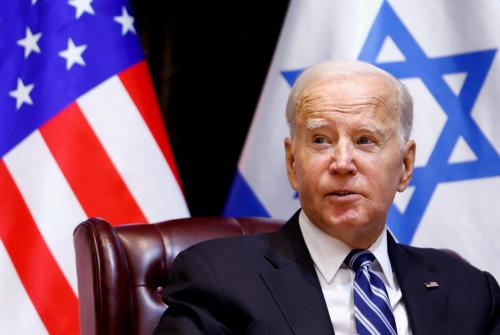The Biden administration’s response to the atrocious attack by Hamas and the ensuing crisis can be seen from three perspectives: the immediate response, the need to deal with the major challenges presented by the crisis, and the administration’s quest to fit its response into its larger Middle Eastern policy.
The Biden administration’s response
The administration and President Joe Biden, in particular, swiftly responded to the shock of the surprise attack, Israel’s initially ineffective response, and the graphic reports and footage of Hamas’ atrocities. Biden stood up as a staunch friend and supporter of Israel and delivered two eloquent speeches that expressed his feelings and emotions and laid the foundation for the actual measures of support: dispatching two aircraft carrier groups to the region, sending resupplies, and announcing a large financial aid package that has yet to go through Congress.
The president and Secretary of Defense Lloyd Austin issued warnings to Iran and its proxy Hezbollah not to join the fray. This was particularly important in the first two days as the Israel Defense Forces was seeking to regain its grip as it was recovering from the initial shock. The U.S. secretaries of state and defense flew to Israel as did Biden himself on October 18.
Biden’s trip to Israel
The president’s visit, in addition to serving as a powerful expression of sympathy, was also intended to deal with two immediate challenges: preventing the war’s expansion through an attack by Hezbollah or a less likely Israeli preemptive strike, and the need to limit the scope of Israel’s imminent ground operation to contain the damage to the civilian population. There was a gap between Israel’s war planning and the U.S. concern with the civilian population and it took some give and take in order to come to a common view of the ground operation.
It should be considered that Biden’s relationship with Prime Minister Benjamin Netanyahu is quite complex. Biden has been critical of the Netanyahu government’s extreme right-wing character as well as of its so-called judicial overhaul. For several months, Biden refused to invite Netanyahu to the White House. More recently, this tension subsided when Biden realized that he needed Netanyahu’s help in order to get part of his anticipated agreement with Saudi Arabia through Congress. He also needed Netanyahu to respond to U.S. and Saudi demands to offer significant concessions to the Palestinians; the two met in New York in September and had a reasonably good meeting, but the underlying tension and policy differences are still there.
The administration’s Middle East policy
There is also the need to deal with the morning after and to adapt the Biden administration’s larger policy in the region. The Biden administration needs to cope with a potential threat to the stability of allies like Egypt and Jordan as well as with Arab, European, and some domestic criticism of its support for Israel. Given Iran’s effort to activate five different proxies (Lebanese Hezbollah, Yemen’s Houthis, Hamas, Palestinian Islamic Jihad, and Syria’s Bashar al-Assad regime) against Israel, the challenge it presents to the United States itself as well as to several of Washington’s Arab allies, and the lingering nuclear issue, a more effective U.S.-Iranian policy is called for.
If we assume that Israel will inflict a deadly blow on Hamas as a military organization and government, decisions will have to be made about Gaza’s future. Clearly, Israel does not want to remain in the Gaza Strip and control and administer another 2 million Palestinians. The only reasonable and possibly available party to take control would be the Palestinian Authority (PA), which was brutally expelled by Hamas in 2007. The PA itself, it should be added, is weak, unpopular, and on the eve of a potential succession struggle. It would not want to return to Gaza on Israeli bayonets and an interim regional or international caretaker would have to be found.
This issue is intimately tied to the key components of the Biden administration’s Middle East policy. The administration came into office with little appetite to deal with Middle Eastern issues. Its stated objective was to refrain from an effort to resolve the Israeli-Palestinian conflict and to focus instead on protecting the Palestinians’ quality of life and to keep the two-state option alive.
The prospects of an American-Saudi pact
With regard to Saudi Arabia, the Biden administration adopted the progressive Democrats’ critical view. Subsequent efforts by Biden to fix the relationship and obtain Saudi cooperation on oil production and prices were rebuffed. This began to change a few months ago when the negotiations over a massive entente began to take shape.
Until October 7, the prospects of an American-Saudi pact reinforced by Saudi-Israeli normalization were two important dimensions of a new U.S. strategy in the region. Around them, a coalition of moderate, pro-American states could be consolidated against Iran and its proxies, Russia, and China. And to boot, some progress on the Palestinian issue would be registered.
Right now, the notion of Israeli-Saudi normalization is suspended. However, future moves by the United States and Israel, a blow to Hamas, and deterring Iran and Hezbollah could be early steps in the consolidation of a pro-Washington coalition. Washington’s early and effective rallying to Israel’s aid is a powerful signal to other U.S. allies in the region. In any event, pivoting away from the Middle East is not currently an option.
For Israel, the need to solve its immediate problems (first and foremost, the hostages), restore its credibility vis-à-vis Washington and its own Middle Eastern partners, and repair its overall deterrence are of paramount importance. These tasks need to be carried out by a controversial government reinforced by temporary partners to an emergency war cabinet. In the war’s aftermath, there will be time and pressure for soul-searching and reckoning.







Commentary
The Biden administration and the Gaza war: The view from Tel Aviv
October 24, 2023